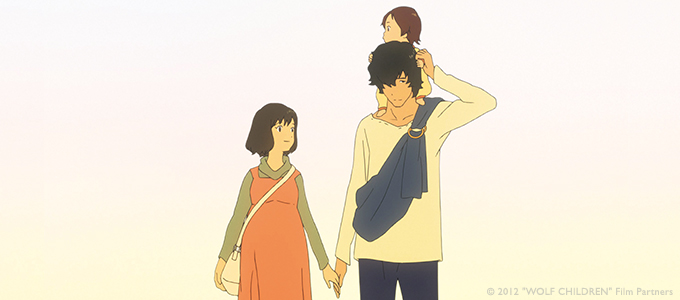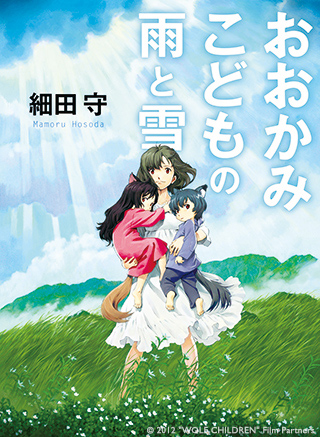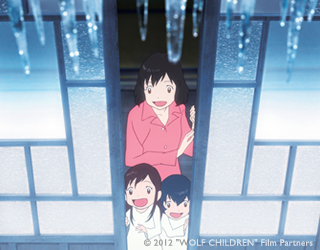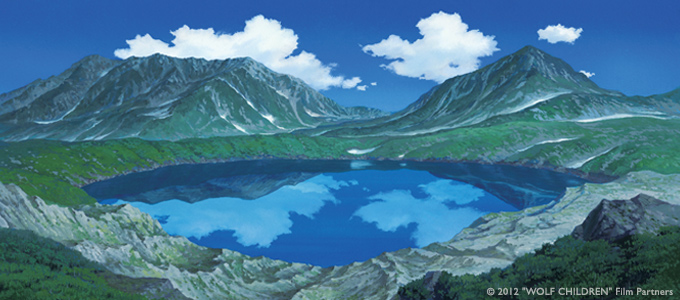
Rites of Passage
Which way is Japanese anime headed? This is an age old question in which the word "anime" could be replaced with any other industry in Japan. It is a serious question that we haven't been able to answer.
Does the worldwide exportation of Japanese culture advance by meeting generic and global standards, or by gaining approval through further heightening the uniqueness of Genroku culture, much like the times of Edo period’s national isolation*? Sometimes it seems as though these are the only options left for Japan.
Director Hosoda is able to gently affirm both options. As he attended film festivals overseas, he was stimulated by his exchange with other guests and media. This lead him into strongly believing that the universal reception of film could be maintained even if the director’s originality and cultural background is introduced into it.

“All film directors I met in foreign film festivals were seriously in touch with problems back home. It may not be a familiar problem for someone from another culture. But by acutely focusing on the circumstances they are in, they try to uncover the basis of the issue. That very ‘basis’ is what is most important to the ‘universality’ of film.”
“So by honestly depicting the core theme, no matter whose story it is, universality can be attained. That is why I feel like I want to describe what surrounds me better. If I didn’t want to express from my heart, the viewers wouldn’t understand the basis, and it wouldn’t appeal universally. To prepare a story of ‘someone’ to a hypothetical audience is most likely going to be boring.”
“For every director that exists there are as many lives and viewpoints. That’s what’s interesting! But by trying to incorporate all opinions and to sum up a common denominator that works for everyone puts the main message out of focus. I think a film is outstanding when its not a common story but has the ability to arouse deep empathy across the board. I want to always keep that in mind, as I plan to make more films as a Japanese director.”
For every director that exists there are as many lives and viewpoints.
In the film Wolf Children he uses his hometown Toyama and its nature as backdrop. For Director Hosoda, this was not an egocentric choice, but from all the supposed locations, he rediscovered the uniqueness of the nature of northwestern Japan, and he wanted it to universally touch as many people as possible.
“Although I claim to be from Toyama, I actually grew up in the urban area, so I wasn’t that familiar with the nature of Hokuriku**. Furthermore, I never thought where I lived was that special. (laugh) But when I revisited it for the last film, it looked totally different to me. I was shocked that it was so steep and oh so gorgeous. A very unique landscape that is different from all others.”
“Especially the Northern Alps, to be blunt, is not a healing kind of landscape. It’s not at all like the rural scenery of Japan with rice fields. The nature there is jagged and rocky, and it is overwhelmingly vertiginous. If something goes wrong, it is as though we could get eaten alive.”

“When I was a kid there was what the locals called the Blizzard 56, a huge snow storm that hit all of Hokuriku Japan in 1981. Even in the plains it accumulated up to 1.6m. When we said ‘that was an incredible blizzard,’ the generation of our parents will one up us by saying ‘The Blizzard 38 was even worse. There was more than 2m of snow!’” (laugh)
His upbringing and experience so close to the harsh mother nature of Hokuriku doesn’t directly translate into the characteristics of the protagonists of Hosoda films. However, it has greatly influenced his disposition as a creator. That, for example, is well expressed in Wolf Children where people live in a gentle symbiosis with nature.
“When it rains and snows a lot you don’t go outside, naturally. More time is spent indoors. You read books, become introverted, and you face yourself. I am not saying all people of Hokuriku Japan are like that. (laugh) But I think it was good for me to have the time to look at myself calmly and let my imagination run wild. Also, I feel like when the weather is bad, you find more ground to cultivate some kind of scenario.”
“When we did the premiere of Wolf Children in France, the local media asked most about the theme of ‘the clash between civilization and mother nature.’ That was never inquired about in Japan. Maybe it was because of the recent earthquake disaster, but the Japanese media interviewed me and only wanted to ask about the film’s portrayal of ‘family-ties.’ Once again I noticed the difference of how Westerners take things in. For the Western world, maybe the fact that civilization has ruled over nature for so long is now causing an emotional swinging back towards awareness or guilt. Like, ‘Are we able to continue on like this?’”
“For me, the film is not about living as a human or living as a wolf in nature. It’s not supposed to be a story about which is the right choice. Even as wolf offspring, both the sister and brother decide to live their own chosen life. Just how the mother decided to give birth to the children of a wolf. At the end, humans are only able to move forward on the path they believe is right for them.”
The mountain of “life” is always steep. For this very reason, we must walk our own path of truth. That is not a privilege given to only a small group of people. Whatever your past, whatever the current situation, a person can become stronger on the day they decide to move forward. As long as anime creation includes this simple message, conveyed honestly and universally, hope can be placed in it. May Japanese anime continue to progress steadily on an uncharted map.
* The national isolation “sakoku” of Japan (mid1600s–mid1800s):Japan didn’t allow any foreigners to enter nor any Japanese to leave the Japanese territory as part of its foreign policy.
** A region in northwestern Japan facing the Sea of Japan that includes Toyama, Fukui, and Ishikawa prefectures.
(Sometimes Niigata prefecture is also included.)
(Interview: Manami Iiboshi, Translation: Mika Anami)

